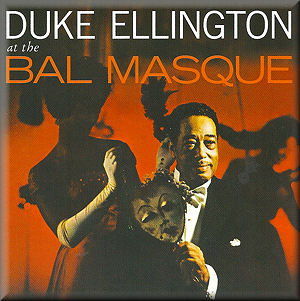1. Alice Blue Gown
2. Who's Afraid Of The Big Bad Wolf
3. Got A Date With An Angel
4. Poor Butterfly
5. Satan Takes A Holiday
6. The Peanut Vendor
7. Satin Doll
8. Lady In Red
9. Indian Love Call
10. The Donkey Serenade
11. Gypsy Love Song
12. Laugh, Clown, Laugh
13. Everything But You
14. Black Beauty
15. All Too Soon
16. Something To Live For
17. Mood Indigo
18. Creole Blues
19. Don't You Know I Care
20. A Flower Is A Lovesome Thing
21. Mighty Like The Blues
22. Tonight I Shall Sleep
23. Dual Highway
24. Blues
Tracks 1-12
Duke Ellington - Piano
Clark Terry, Cat Anderson, Willie Cook, Harold "Shorty" Baker - Trumpets
Ray Nance - Trumpet, violin
Quentin Jackson, Britt Woodman, John Sanders - Trombones
Jimmy Hamilton - Clarinet, tenor sax
Russell Procope - Alto sax, clarinet
Johnny Hodges - Alto sax
Bill Graham - Alto sax, tenor sax, baritone sax
Paul Gonsalves - Tenor sax
Harry Carney - Baritone sax, clarinet, bass clarinet
Jimmy Woode - Bass
Sam Woodyard - Drums
Tracks 13-24
Duke Ellington - Piano
Ray Nance - Trumpet
Lawrence Brown - Trombone
Johnny Hodges - Alto sax
Paul Gonsalves - Tenor sax
Harry Carney - Baritone sax, bass clarinet
Aaron Bell - Bass
Sam Woodyard - Drums
Many of Duke Ellington's albums consist entirely or mainly of his
own compositions, and I can't complain about that, since he is a great
composer as well as bandleader and pianist. Yet, strangely enough,
some of my favourite Ellington albums are those where he arranges
other people's music. For example, I like Ellington '55,
which
I reviewed here three years ago. That album contained three of Duke's
numbers but the remaining tracks were by other people. At the Bal
Masqué, released in 1959, is an album of a dozen tracks, comprising
eleven standards and just one Ducal composition: Satin Doll.
The Ellington orchestra had apparently appeared for several weeks in 1958 at the Bal Masqu‚, a club at the Hotel Americana in Miami. This inspired the album's title, and audience applause is heard between each track. The applause was actually dubbed onto studio recordings, although it helps to give the intimate feeling of a live concert.
Many of these tunes were never recorded by the Duke again, although Alice Blue Gown was recorded again ten years later by an Ellington octet at New York's Rainbow Grill. This makes an appealing opener for the album, with Duke stating the theme at the piano. One attraction of this album is that Ellington is heard quite a lot as a pianist, and he seems to be enjoying himself, treating unfamiliar material to unique Ducal harmonies. This track also includes a buoyant alto solo from Johnny Hodges.
The band never again recorded Who's Afraid Of The Big Bad Wolf, a tune you might not expect in the Ellington repertoire, but his arrangement gives it a jaunty bounce, with Clark Terry soloing joyfully. Every track is noteworthy but other particularly notable tracks include Poor Butterfly, on which the theme is shared out between Ray Nance's ethereal violin and Jimmy Hamilton's soaring clarinet. Ellington and Paul Gonsalves play rhapsodic solos.
If you've never heard of Satan Takes a Holiday before (I hadn't), it's a Larry Clinton tune which gives Harry Carney the chance to display the devil in his soul. The Peanut Vendor is not quite as wild as Stan Kenton's version but it is still thrilling. Lady in Red (thankfully not the Chris De Burgh number but the 1935 film song) has a seductive Latin-American beat. Ellington cooks up a pleasing counter-melody on the piano for Indian Love Call as well as an inventive solo. The Donkey Serenade employs some appropriate wa-wa mutes in a cheeky arrangement. Ray Nance's gypsy violin also features appropriately in Victor Herbert's Gypsy Love Song.
The Bal Masqué album is one of my many favourites among Ellington recordings. It seems to be a happy album, with Duke having a bal(l). The original LP lasted for barely 40 minutes, so this CD augments it with another dozen tracks recorded on 14 July 1960. These have been released under the title Unknown Session and they definitely don't deserve to be unknown. Ellington led a hand-picked octet of Ellingtonians playing tunes that the band had played in earlier years. These were mostly Ducal compositions - except for Mighty Like The Blues, a Leonard Feather invention, whose opening bars were used by the Duke in his soundtrack for the 1961 film Paris Blues.
Again, every track is a highlight but I can pick out a few of the most outstanding numbers. Everything But You is an attractive song which Duke should have played more often. Harry Carney and Ray Nance contribute outspoken solos. Black Beauty is one of Ellington's most beautiful creations, dedicated to dancer Florence Mills and played poignantly by trombonist Lawrence Brown. Brown also features on All Too Soon (another lovely Ducal invention), Mood Indigo (an Ellington staple) and Creole Blues.
Billy Strayhorn's invaluable contribution to the Ellington repertoire is represented by Something To Live For (his first major collaboration with Duke) and A Flower Is A Lovesome Thing, one of Billy's masterpieces. Johnny Hodges's radiant alto is featured on the ballad Tonight I Shall Sleep and the gutsier Dual Highway. This LP ended with Blues, where every front-line instrument plays two choruses.
I recommend this CD unreservedly, because it contains two of Ellington's least-known but most relaxed LPs. And they both include a lot of what we seldom hear enough: Duke at the piano.
Tony Augarde
www.augardebooks.co.uk
